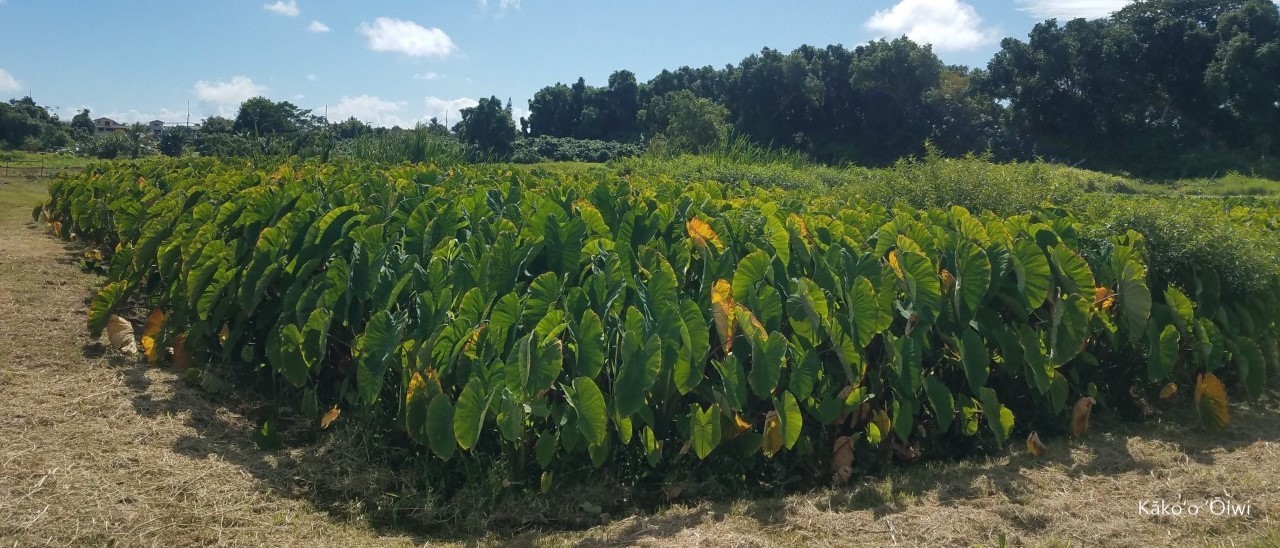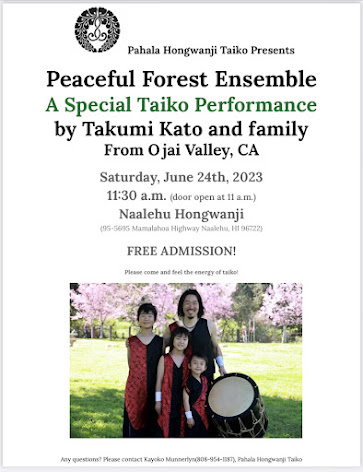In the Kaʻū District Category, Miranda's Farms' first place finish was followed by Navarro Farms and the Norberte family's JN Farms. Miranda's Farms scored 86.75 points. The Geisha beans were parchment-dried without yeast and conventionally cultivated. Navarro Farms scored 84.35 points. The Pacamara beans were parchment-dried with yeast and conventionally cultivated. JN Farms scored, 83.75 points. The Bourbon beans were fruit-dried with yeast and conventionally cultivated. Kaʻū's top three coffees ranked higher than any of the coffees from O'ahu and Hamakua.
Here are the other Kaʻū Coffees that earned a high ranking with over 80 points:
 |
| The mauka orchard of Miranda's Farms, which took first in Kaʻū and second statewide at the 14th annual Hawai'i CoffeeAssociation Cupping Competition this weekend. Photo from Miranda's |
Casablanca Farms, LLC scored 83.44 points with its Geisha Catuai beans, pulp dried with no yeast and conventionally cultivated.
R&G Farm scored 82.65 points with its Typica beans, parchment-dried without yeast and conventionally cultivated.
Wido Farms, LLC scored 82.50 points with its Caturra beans, parchment-dried, without yeast and conventionally grown.
Rusty's Hawaiian's second entry scored 82.35 points with its Typica beans, parchment-dried without yeast and conventionally cultivated.
Miranda's Farms' second entry scored 82 points with its Caturra beans, parchment-dried without yeast and conventionally cultivated.
Navarro Farms' second entry scored 81.90 points with its Pacamara beans, pulp dried with yeast and conventionally cultivated.
Wido Farms, LLC's second entry scored 81.15 points with its Typica beans, parchment-dried without yeast and conventionally cultivated.
Silver Cloud Coffee Farm scored 80.85 points with its Catuai & Typica beans, parchment-dried, without yeast and conventionally cultivated.
Casablanca Farms, LLC's second entry scored 80.81 points with its Geisha beans, fruit-dried with yeast and conventionally cultivated.
 |
| Kaʻū Coffees did well in the 14th annual Hawai'i Coffee Association Cupping Contest. Photo from HCA |
Second went to Miranda's Farms, with 86.75 points. The Geisha beans were parchment-dried without yeast and conventionally cultivated in Kaʻū.
Third went to Greenwell Farms, Inc., with 86.35 points. The Geisha beans were fruit-dried without yeast and conventionally cultivated in Kona.
Fourth went to Monarch Coffee with 85.94 points. The Pacamara beans were fruit-dried without yeast and conventionally cultivated in Kona.
Fifth went to Heavenly Hawaiian with 85 points. The Progeny 502 beans were parchment-dried without yeast and conventionally cultivated in Kona.
Sixth went to Imagine 100% Kona Coffee. The Typica beans were parchment dried with yeast and conventionally cultivated in Kona.
Seventh went to Kona RainForest Farms, LLC with 84.88 points. The K7 beans were parchment -dried without yeast and and organically cultivated in Kona.
Eighth went to Hula Daddy Kona Coffee, LLC with 84.75 points. The Kona Mocca beans were fruit-dried with yeast and conventionally cultivated in Kona.
Ninth was Kamaole Ranch with 84.60 points. The Red Catuai beans were parchment-dried with yeast and conventionally cultivated on Maui.
Tenth was Ka'awaloa Trail Farm with 84.55 points. The Typica beans were parchment-dried without yeast and conventionally grown in Kona.
To read comments, add your own, and like this story, see facebook.com/kaucalendar. See latest print edition at kaucalendar.com, in the mail and on stands.
OFFICE OF HAWAIIAN AFFAIRS' MAHI 'AI AGRICULTURAL LOAN is new this year. OHA's Native Hawaiian Revolving Loan Fund introduced the program to support Native Hawaiian farmers across the pae ʻāina. A statement from OHA says, "The Mahi ‘Ai Agricultural Loan Program is another way that OHA is meeting the business needs of Native Hawaiians who are starting a farm or expanding an existing one."
“For nearly 35 years, OHA has provided Native Hawaiians with low-interest loans to start or expand their businesses,” said Aikū‘ē Kalima, OHA’s Native Hawaiian Revolving Loan manager. “To diversify our loan portfolio and support mahi ‘ai, or farmers, we have earmarked funds specifically for agricultural businesses.”
The OHA statement says the program has unique features "that keep the needs of mahi ‘ai in mind." In addition to the low-interest rates, new borrowers have the option of deferring their loan payments for the first six months without incurring additional interest. “We recognize that it takes time for crops to grow, or livestock to reach a certain stage, before they can generate revenue for farmers, and we’ve taken that into consideration to help ensure our loan recipients are off to a good start,” Kalima said. “These loans will not only help Native Hawaiians build strong businesses working in harmony with the land to support their families and provide jobs for others in the community, but also support food security to help Hawai‘i become more resilient.”
OHA offers agricultural business loans up to seven years at 4% APR for amounts between $2,500 and $100,000 for in-ground or above-ground farming, greenhouse, hydroponic, and other types of farming, including raising livestock.
All owners of the business must be of Native Hawaiian ancestry. Loan applicants must be State of Hawai‘i adult residents and meet stringent criteria, including having a credit score of 600 or higher and their debt-to-income ratio must be no more than 45%. The business must also be registered with the Department of Commerce and Consumer Affairs and be in good standing.
For more information on the Mahi ‘Ai Agricultural Loan Program, visit https://loans.oha.org/mahiai-agricultural-loan/, email NHRLF@ohaloanfund.org or call the OHA office at (808) 594-1835.
 |
| The new OHA Mahi'ai Agricultural Loan program offers from $2,500 to up to $100,000 to support food security. Photo from OHA |
OFFICE OF HAWAIIAN AFFAIRS' MAHI 'AI AGRICULTURAL LOAN is new this year. OHA's Native Hawaiian Revolving Loan Fund introduced the program to support Native Hawaiian farmers across the pae ʻāina. A statement from OHA says, "The Mahi ‘Ai Agricultural Loan Program is another way that OHA is meeting the business needs of Native Hawaiians who are starting a farm or expanding an existing one."
“For nearly 35 years, OHA has provided Native Hawaiians with low-interest loans to start or expand their businesses,” said Aikū‘ē Kalima, OHA’s Native Hawaiian Revolving Loan manager. “To diversify our loan portfolio and support mahi ‘ai, or farmers, we have earmarked funds specifically for agricultural businesses.”
The OHA statement says the program has unique features "that keep the needs of mahi ‘ai in mind." In addition to the low-interest rates, new borrowers have the option of deferring their loan payments for the first six months without incurring additional interest. “We recognize that it takes time for crops to grow, or livestock to reach a certain stage, before they can generate revenue for farmers, and we’ve taken that into consideration to help ensure our loan recipients are off to a good start,” Kalima said. “These loans will not only help Native Hawaiians build strong businesses working in harmony with the land to support their families and provide jobs for others in the community, but also support food security to help Hawai‘i become more resilient.”
OHA offers agricultural business loans up to seven years at 4% APR for amounts between $2,500 and $100,000 for in-ground or above-ground farming, greenhouse, hydroponic, and other types of farming, including raising livestock.
All owners of the business must be of Native Hawaiian ancestry. Loan applicants must be State of Hawai‘i adult residents and meet stringent criteria, including having a credit score of 600 or higher and their debt-to-income ratio must be no more than 45%. The business must also be registered with the Department of Commerce and Consumer Affairs and be in good standing.
For more information on the Mahi ‘Ai Agricultural Loan Program, visit https://loans.oha.org/mahiai-agricultural-loan/, email NHRLF@ohaloanfund.org or call the OHA office at (808) 594-1835.
To read comments, add your own, and like this story, see facebook.com/kaucalendar. See latest print edition at kaucalendar.com, in the mail and on stands.




.jpg)


